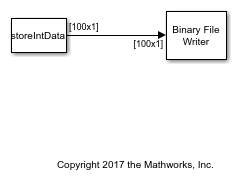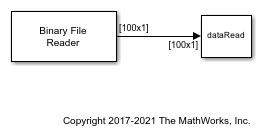Write and Read Fixed-Point Data from Binary Files in Simulink
The Binary File Writer and Binary File Reader blocks do not support writing and reading fixed-point data. As a workaround, you can write the stored integer portion of the fi data, read the data, and use this value to reconstruct the fi data.
Write the Fixed-Point Data
Create a fi object to represent 100 signed random numbers with a word length of 14 and a fraction length of 12.
data = randn(100,1); fiDataWriter = fi(data,1,14,12); storeIntData = storedInteger(fiDataWriter);
Write the stored integer portion of the fi object to the data file myFile.dat. The built-in data type is int16, which can be computed using class(storeIntData).
writeModel = 'writeFixedData';
open_system(writeModel)
sim(writeModel)

Read the Fixed-Point Data
Specify the reader to read the stored integer data as int16 data with 100 samples per data frame.
readModel = 'readFixedData';
open_system(readModel)
sim(readModel)

The real-world value of the fixed-point number can be represented using 2^[-fractionLength*storedInteger]. If you know the signedness, word length, and fraction length of the fixed-point data, you can reconstruct the fi data using fi(realValue,signedness,wordLength,fractionLength). In this example, the data is signed with a word length of 14 and a fraction length of 12.
fractionLength = 12; wordLength = 14; realValue = 2^(-fractionLength)*double(dataRead); fiDataReader = fi(realValue,1,wordLength,fractionLength);
Verify that the writer data is same as the reader data.
isequal(fiDataWriter,fiDataReader)
ans = logical 1
See Also
To Workspace (Simulink) | Binary File Writer | Binary File Reader | Signal From Workspace